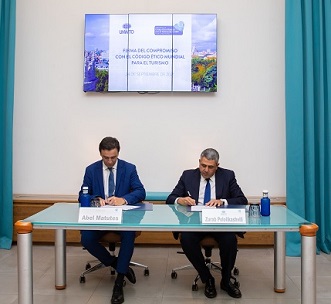 MADRID, SPAIN—The Chairman/President of Palladium Hotel Group, Abel Matutes Prats, and the CEO of the company, Jesús Sobrino, together with the Secretary-General of the World Tourism Organization, Zurab Pololikashvili, have signed the Global Code of Ethics for Tourism promoted by the UNWTO. With this adhesion, the hotel company belonging to the Empresas Matutes Group, which has been developing and promoting the principles of the Code of Ethics for some time, reaffirms its commitment to sustainability in the field of tourism.
MADRID, SPAIN—The Chairman/President of Palladium Hotel Group, Abel Matutes Prats, and the CEO of the company, Jesús Sobrino, together with the Secretary-General of the World Tourism Organization, Zurab Pololikashvili, have signed the Global Code of Ethics for Tourism promoted by the UNWTO. With this adhesion, the hotel company belonging to the Empresas Matutes Group, which has been developing and promoting the principles of the Code of Ethics for some time, reaffirms its commitment to sustainability in the field of tourism.
After the signing, which took place at the headquarters of the World Tourism Organization, the Secretary-General of the UNWTO, Zurab Pololikashvilli, said that, “We congratulate Palladium Hotel Group for leading the way towards a more ethical and responsible tourism sector. We count on you to be ambassadors of the principles of the Global Code of Ethics for Tourism”.
Abel Matutes Prats said, “Since the beginning of our journey we have been very aware of the importance and responsibility of tourism activity and, therefore, we already applied these principles. The signing of the Code of Ethics reinforces our commitment to the sustainable development of this industry.” For his part, the CEO of Palladium Hotel Group, Jesús Sobrino, emphasized that, “We defend responsible tourism for society and the environment and we work constantly to achieve this. This code shares sustainability and social development objectives with our Corporate Social Responsibility and is aligned with our global commitment as a company.”
Approved by the General Assembly of the World Tourism Organization and subsequently ratified by the General Assembly of the United Nations, this code, whose purpose is to guide the various agents of tourism development, consists of ten principles that establish a global reference framework for the responsible and sustainable development of world tourism. It also seeks the promotion of an equitable, responsible and sustainable tourism order, for the mutual benefit of all sectors of society and in an open economic environment.
The ten principles contained in the Code of Ethics cover the economic, social, cultural and environmental components of travel and tourism and address aspects such as the contribution of tourism to mutual understanding and respect between people and societies, its role as an instrument of personal and collective development and as a factor of sustainable development, tourism activity as an element of exploitation and enrichment of the cultural heritage of humanity or the recognition of tourism as a beneficial activity for destination countries and communities. The document also covers the right to tourism, the obligations of tourism development agents and the rights of workers and entrepreneurs in the sector. Article 10 of the Code recognizes the role of the World Committee on Tourism Ethics (WCTE).







